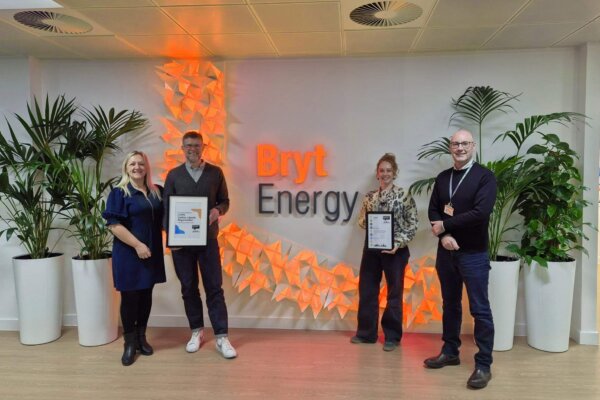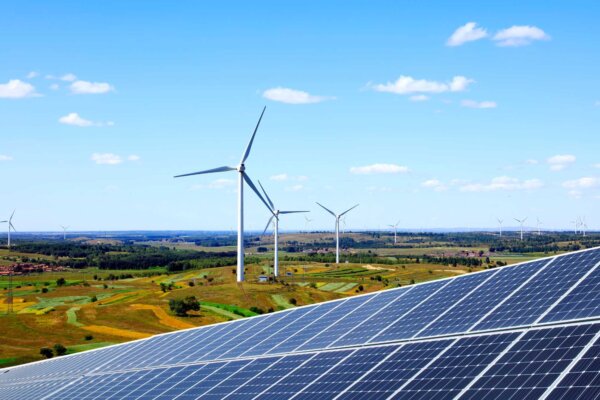It’s been a summer of exceptional climate events – but this last month has seen encouraging steps and solutions that will help the UK and businesses towards net zero. From record-breaking flexibility market milestones and new international sustainability reporting standards, to key recommendations that could halve grid connection delivery time, there is lots to discuss. Keep reading to understand what these updates could mean for your business.
Empowering business net zero plans
Record-breaking year for the flexibility market
UK adopts international climate disclosure standards
Call to halve UK grid connection delivery timeline
Spotlight on renewables
News in Brief
Empowering business net zero plans
The UK Government has launched its Business Climate Hub, a new website with actionable insights to help businesses with their net zero transition.
Offering valuable tools and advice on how companies can reduce energy costs and emissions, the website is backed by the Net Zero Council – made up of Ministers, business leaders and finance experts aimed at driving forward the UK industry’s transition to net zero. With business and industry accounting for around 25% of the UK’s emissions, the Business Climate Hub offers tangible support for companies across all sectors, with a particular emphasis on SMEs1.
The support provided includes a carbon calculator and a variety of resources to help measure, track and report on emissions. Detailed advice covers a range of energy-related topics, such as switching to electric vehicles (EVs), installing solar panels and low-carbon heating, as well as efficient lighting solutions and training for more fuel-efficient driving.
You can explore the resources on the UK Business Climate Hub here.
As well as the Business Climate Hub, the Net Zero Council, together with the UK’s Department for Energy Security and Net Zero (DESNZ) published business sector roadmap guidelines for reducing emissions2. The guidelines provide a framework for different sectors to tackle their specific challenges and will help businesses create tailored action plans.
The guidelines call for roadmaps to include:
- A credible pathway to net zero
- Robust delivery plan
- Mechanisms for collaboration
- Independent assessment of roadmaps
Being business-led, the Net Zero Council hope the guidelines can address the challenges that different businesses face and collectively contribute to the UK’s net zero aspirations.
To find out more about the criteria for developing a business roadmap for net zero, click here.
This comes after polling continues to show the UK public supports the country’s 2050 net zero target. A new survey shows 70% of respondents support the UK’s target of becoming net zero by 2050, compared to just 18% who oppose the goal3.
Record-breaking year for the flexibility market
Last year marked a turning point for the UK’s flexibility markets, as the Energy Networks Association (ENA) revealed that electricity network companies – responsible for distributing energy from where it is generated to consumers – tendered a record 4.6GW of flexible energy capacity4.
According to ENA, these figures suggest the UK is one of the biggest flexibility markets in the world. The ENA also highlighted that local flexibility services allow for energy usage to be synchronised with the needs of the system, which is crucial in supporting the net zero transition and ensuring the country maximises the use of renewable power generation.
In fact, research by Cornwall Insight shows that by embracing flexible electricity usage nationwide, the UK would avoid the need to construct four additional gas-fired power stations in 20305. This would result in cost-savings of more than £2.5 billion while reducing the need for infrastructure upgrades, saving an additional £1 billion. And from reducing costs to accessing new revenue streams, there are financial benefits for businesses prepared to participate too.
For more information, our series of guides on “Navigating the net zero energy transition” covers key considerations for businesses navigating the energy transition, steps they can take to gain control of their energy usage, and the low-carbon technologies that can help in the process. Click here to download them.
Stuart Taylor, Head of Energy Transition, Bryt Energy, said: “This is an extremely encouraging sign that more organisations are adopting flexibility within their energy strategies, as the UK continues to be one of the biggest flexibility markets in the world. We believe flexibility through optimisation is something most businesses could achieve – some may not even know it. We encourage readers to take a look at our series of brand new e-guides to understand how they can reap the benefits of optimisation.”
UK adopts international climate disclosure standards
The UK’s Department for Business and Trade has announced business climate disclosures will be based on the newly released International Sustainability Standards Board (ISSB) guidelines6. These were originally announced at COP26 in 2021, with the goal of developing a comprehensive global baseline of sustainability reporting criteria.
The move, which will inform the creation of the UK Sustainability Disclosure Standards, will enable businesses and corporations to report on their climate-related activities with a simpler, more streamlined process. It is also hoped this framework will make the UK more attractive to investors, who will be able to rely on a globally consistent approach when factoring a business’ sustainability-related practices into their decisions.
The UK already requires its largest listed companies, as well as private businesses with more than 500 employees and a turnover of £500 million, to disclose information on climate-related financial risks and opportunities. Currently, this is done through the Task Force on Climate-related Financial Disclosures guidelines (TCFD), which the ISSB standards are built upon. The switch to ISSB comes as the European Union has also announced the new European Sustainability Reporting Standard, which will also see ISSB alignment.
The announcement follows results of Workiva’s 2023 Global ESG Practitioner Survey, showing a growing number of sustainability managers and other professionals believe reporting will play a prominent role in driving competitiveness for their organisation7. It found 90% of respondents believe having a strong ESG reporting programme will give their organisations a competitive advantage in the next two years.
You can find out more about the survey results at this link.
Call to halve UK grid connection delivery timeline
A new report by Nick Winser, the UK’s Electricity Networks Commissioner, shows how the UK could halve the time required to build grid infrastructure8. Based on his engagement with stakeholders across the electricity transmission network between July 2022 and 2023, the report investigates how the UK can accelerate the deployment of strategic electricity transmission infrastructure to allow new renewable energy projects to connect to the grid faster.
The amount of renewable energy being generated in the UK has increased in recent years, but grid infrastructure development has not kept up. As a result, renewable generation projects can struggle to connect to the grid. This has seen more than 230GW of renewable generation projects in the connection queue, compared to around 80GW currently connected to the grid and supplying electricity across the UK.
The recommendations centre around the speedy creation of the Future System Operator (FSO) to forecast energy supply and demand. Other recommendations include establishing clear guidelines on what the benefits that communities affected by new transmission lines should receive, as well as a major review of UK engineering and technician jobs and skills.
The report’s 18 recommendations aim at speeding up connection times by initially three years, and ultimately halve it to around seven years. The findings have been welcomed by those in the wind industry, as the current delays for grid connection negatively affect the construction and operation of new wind farms.
To see what else the report recommends, click here.
Spotlight on renewables
The UK Government’s 2023 Electricity Generation Costs report has forecast that producing electricity from renewables will be 61% cheaper than using gas in 20259. This offers further evidence of the business case for renewable energy generation, highlighting the cost benefits compared to generating energy from fossil fuels.
The study forecasts that in 2025:
- Gas prices will rise to £114 per MWh
- Offshore and onshore wind prices will fall to £44 per MWh
- Solar will fall to £41 per MWh.
What’s more, the parallel increase in gas prices and fall in renewable costs is set to continue over the next two decades, with solar expected to become 83% cheaper than gas by 2040.
The figures, which are the first estimates on the costs of generation published by the Government since 2020, have been welcomed by industry trade bodies, including Solar Energy UK. Its Chief Executive, Chris Hewett, said the findings were “further justification” for the Government’s target to reach 70GW of solar capacity by 203510.
To read the Electricity Generation Costs report, click here.
News in Brief
- The UK Space Agency has announced £15 million to enhance satellite Earth Observation (EO) technologies11. These specifically target ecological services, such as meteorology, climate monitoring, and environmental management, which will look at better managing resources, responding to humanitarian disasters and protecting our environment.
- A report from reinsurance group Swiss Re. revealed that natural disasters cost insurers £39 billion in losses during the first half of 202312, with a series of severe storms in the USA alone accounting for 68% of that global loss. Climate change is causing a higher frequency and intensity of severe weather events, and these figures further highlight the importance of action to reduce carbon emissions and the major cost benefits of climate adaptation.
TALK TO OUR TEAM
If you have any questions on how any of the updates might affect your business, our team of experts is on hand to answer them. You can get in touch with us on 01217267575 or at heretohelp@brytenergy.co.uk.
Sources
- https://www.gov.uk/government/news/one-stop-shop-to-help-businesses-save-money-and-go-green
- https://www.gov.uk/government/publications/net-zero-business-sector-roadmap-guidelines
- https://eciu.net/analysis/polling-cards/public-embarrassed-by-politicians-that-renege-on-climate-pledges
- https://www.energynetworks.org/newsroom/great-britain-reaches-new-record-in-contracted-flexibility
- https://www.cornwall-insight.com/off-peak-electricity-use-and-home-generation-could-cut-billions-off-energy-costs/
- https://www.gov.uk/guidance/uk-sustainability-disclosure-standards
- https://www.workiva.com/resources/2023-global-esg-practitioner-survey
- https://www.gov.uk/government/news/government-welcomes-report-on-electricity-networks-as-critical-to-britains-energy-security
- https://www.gov.uk/government/publications/electricity-generation-costs-2023
- https://solarenergyuk.org/news/large-scale-solar-provides-cheapest-power-says-government-report/
- https://www.gov.uk/government/news/uk-space-agency-funding-for-technologies-to-monitor-the-earth
- https://www.swissre.com/press-release/Severe-thunderstorms-account-for-up-to-70-of-all-insured-natural-catastrophe-losses-in-first-half-of-2023-Swiss-Re-Institute-estimates/


